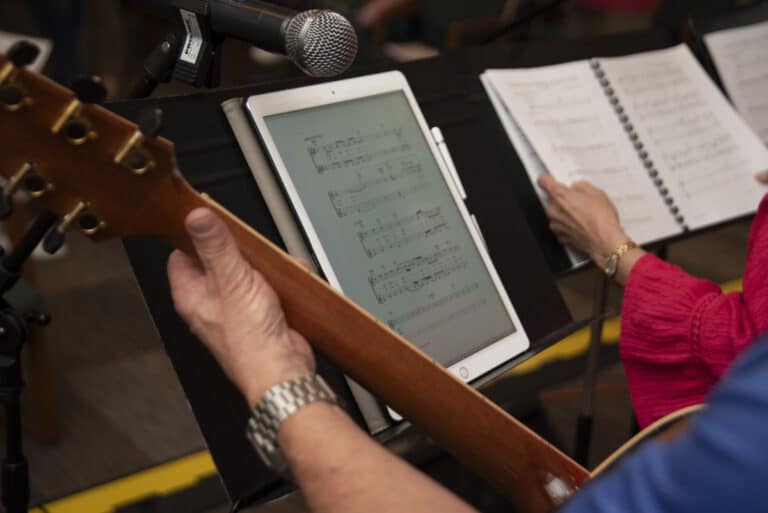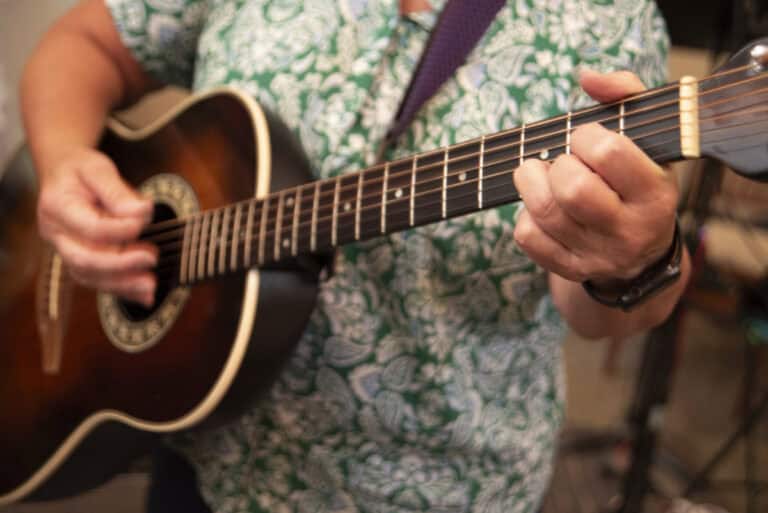As church musicians who serve our parishes throughout Lent, we might be asked to sing at Holy Hours, Stations of the Cross, or even provide meditative music for a penance service. Vocal health becomes an important topic of conversation, as we are engaging our voices more and more during this time of fasting, prayer, and preparation for the pinnacle of our church during Holy Week!
As Pope St. John Paul II so eloquently stated, “We are an Easter people and Alleluia is our song.” (Side note, please look at Sarah Hart’s “Hallelujah is Our Song,” which is absolutely wonderful.)
As music ministers in the church, we know we put our voices through a lot when we are singing from chrism Mass through Easter Sunday. Let’s look at some daily habits we can employ to help maintain vocal health at all times, but especially during those liturgical seasons where the schedule demands that we use our voices a lot.
Drink plenty of water
Water is the foundation of life. Without water, there is no life. The Israelites wandering the desert desired water. Water was the foundation of Christ’s first miracle. Water then poured from His side at the crucifixion. During this season of fasting, be sure to drink plenty of water (and consider cutting back or giving up soda and other beverages). Water is simply the best thing that you can drink for vocal health.
Warm up your voice
A runner would never set out on a 5k without stretching. Anyone who has arrived early to a sporting event has seen the athletes warming up with stretches and repetitive exercises to adequately prepare their bodies for the intensity of a game. The Apostles were given a warmup on carrying on Christ’s mission when he sent them out to preach, heal the sick, and drive out demons. Warmups are necessary. Do the same for your voice — run through some vocal exercises and warmups daily but especially before you sing to maintain your vocal health.
A simple vocal warm up in the shower does the body good. It will also improve your mood for the day. It can even be combined with prayer so that your day begins with your eyes on our Savior. I once attended a workshop given by composer Rollo Dillworth. He told us that every day he begins with the same vocal warmups in the shower: up and down a scale from Do to So (that’s 1, 2, 3, 4, 5), then an octave, then octave and fifth, then two octaves, and so on. Because he has done this for 30 years, he (with the help of falsetto) can accurately sing 4 octaves!
CLEF faculty member Lynné Gray swears by lip trills while working up and down scales, and I agree. Lip trills while singing scales places the voice right in that special pocket in the soft pallet of the mouth that is the healthiest area to sing within.
Also, be sure to read our four-part series on proper vocal technique, which includes exercises to improve breath support.
Use your microphone
I often think about the Sermon on the Mount, where there were 5,000 people covering the hillsides, all straining to hear the teaching of Jesus. I wonder if he had a special way of getting his voice to project in the outdoor environment?
A constant challenge within our worship spaces is our sound systems. Each space is unique. Each system is set up differently. Even the difference between a full congregation and a sparse congregation can make one question if the system is working correctly. Making sure that you are not only familiar with, but comfortable with your sound system is important.
Why? Because we are not in front of a microphone to perform. We are not there to belt out our best Adele impression or to imitate Steven Tyler. We are standing in a sacred place with a sacred mission to help the congregation in full, conscious, and active participation in the liturgy. I encourage everyone to find a good close distance from the microphone to sound present, but not showy, rather than singing louder. Having a gentle, confident, tempo-strong, pitch-assured voice that is close to the mic is remarkably effective regardless of space or attendance. Using the microphone appropriately in this way helps you avoid overworking your voice as well.
When singing close to the mic, be considerate of is your plosives. What’s a plosive? A plosive is a consonant that has a large puff of air behind it. P’s are one of the strongest through a mic. So, my solution is to turn my head slightly so that the puff of air misses the mic head for that syllable.
The bottom line is this: Do not make up for a sound system’s inadequacies by over singing. Make adjustments to your sound system to support your vocal health.
Use sore throat products with caution
Product manufacturers will put all sorts of marketing language on a package, and there’s very little regulation for supplements, which includes throat sprays, lozenges, etc. Many sore throat sprays have a numbing effect that can cause you to overuse your voice or incorrectly use your voice, which isn’t good for your vocal health. All too often, we think “I just have to make it through this Mass, this week, etc.” Yet that is a dangerous way to think because continuing to sing through pain or masking the symptoms with a numbing agent can lead to injury.
If you’re feeling the effects of lots of singing, keep drinking plenty of water and rest your voice as much as possible. Try some hot water with lemon and honey, or some of the lozenges designed specifically for singers (which you may have to order online).
As we continue our Lenten journey and look ahead to Holy Week, we pray that everyone can take care of themselves and prepare adequately for the weeks ahead. Let us hold unswervingly to the hope we have in Christ Jesus. Let us prepare ourselves in spirit, mind, and body to reflect on His sacrifice and to our utmost ability lead our communities in song with humility and grace.
Written by Ray Mullins, a CLEF supporter who has served in music ministry and music education for two decades. He currently serves as a cantor at The Church of the Holy Spirit in Memphis and as a music teacher in Fayette County Public Schools in Tennessee.
Copyright © 2023 Catholic Liturgical Ensemble Formation.



